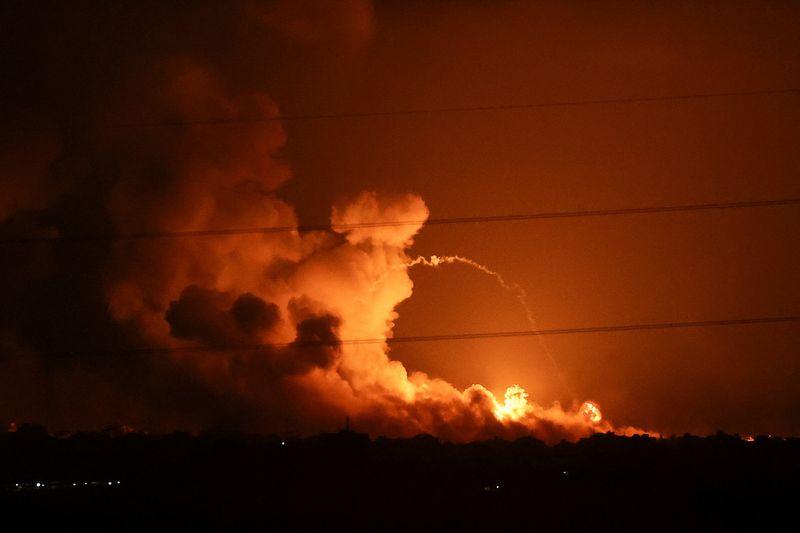Intense Israeli bombardment rocks displaced Gaza residents
2023.11.06 09:30
3/3

© Reuters. Smoke and flames rise during Israeli strikes in the Gaza Strip amid the ongoing conflict between Israel and the Palestinian Islamist group Hamas, as seen from the Israeli side of the border with Gaza, in southern Israel, November 5, 2023. REUTERS/Ronen Zv
2/3
By Nidal al-Mughrabi
GAZA (Reuters) – Palestinians in Gaza emerged on Monday after what residents said was one of the heaviest nights of Israeli bombardment since the war began a month ago, with living conditions deteriorating badly in the tiny, crammed enclave.
In the north, where Gaza City and adjacent refugee camps are surrounded by Israeli ground forces, air and artillery strikes pummelled the area around the major al-Shifa Hospital.
In the south, where Israel has ordered all Gaza civilians to go, saying this would be for their own safety, hundreds of thousands of displaced people, many now living in makeshift shelters, endured heavy bombardment in all the main cities and refugee camps under a communications blackout.
“We stayed up all night. We survived the night, but what about tonight or the coming nights?” said Nisreen, a 35-year-old woman who said her 14-year-old son was killed on Friday in an Israeli air strike on an ambulance.
Israel’s stated military objective is to destroy Hamas, the Palestinian Islamist group whose militants rampaged into Israeli towns on Oct. 7, killing more than 1,400 people and abducting 240 others. Israel said the ambulance it hit on Friday was carrying Hamas fighters, without presenting evidence.
Israel’s bombardment of Gaza has killed almost 10,000 people according to health authorities in the Hamas-controlled enclave. Health authorities and Hamas have denied the ambulance convoy struck by Israel on Friday was carrying fighters or weapons.
The number of reported deaths is far higher than in previous conflicts in Gaza and has also incurred a high proportion of casualties among children, with 4,100 of listed fatalities – or 41% – minors under age 18, according to Gaza’s Health Ministry.
“Last night with the intensive bombing around al-Shifa, smoke and dirt came into the facility and some were freaking out saying Israeli tanks were getting closer,” said Nisreen, who did not want to give a family name for fear of Israeli reprisals.
As the bombardment on the besieged northern areas that Israeli ground troops are entering has intensified, ever more people are trying to shelter around hospitals hoping they may be safer, residents said.
However, Israel has accused Hamas of using hospital premises to launch rockets and conduct other military actions, which the group and the Palestinian Health Ministry have denied.
Outside al-Shifa, displaced woman Haneed Abdelhakim Saad said her family would not leave Gaza City despite the Israeli assault and demands for civilians to go. She fears that if they head to the south of the enclave they will never be allowed back home.
“They can cut off the water, the electricity, the food but we are staying,” she said. “This is what we want: to live in peace, to have our children go out without worrying about them.”
Global calls for a ceasefire in the war have gone unheeded and shortages of food, fuel, drinking water and medicine becoming more acute, with no more than a trickle of humanitarian aid gaining access to the enclave.
MAKESHIFT SHELTERS
In southern Gaza, where private houses and public shelters in schools are heaving with displaced people who fled their own homes, many people are creating their own makeshift places of refuge, sleeping in cars or tents.
Outside Nasser Hospital in Khan Younis, a tent city has emerged around parked vehicles, with plastic sheeting spread from car roofs to provide shade. People sleep or sit, charging phones from car batteries if they have fuel or from solar panels if they do not. Children play in between.
“The first moment I can’t forget is when I saw our house. It was targeted, destroyed and razed to the ground. That place where we used to be comfortable and secure was gone in a second,” said Minna al-Qassas, 18, whose family is now living in their car.
“We came here hoping to find safety and security but it doesn’t exist. When you sleep you hear rockets overhead … People are scattered in the streets, some injured,” she said, adding that had fled Gaza City then stayed with relatives in Khan Younis whose house was also bombed.
Not far off, Mohammad al-Qassas was living with his family under a plastic sheet strung from his car. Their home was destroyed in an air strike but all the public shelters in U.N.-run schools were full, he said.
“Some sleep here on the bed, where we put mattresses, and some sleep down here on the ground. Some sleep on chairs, others lying down,” he said.








